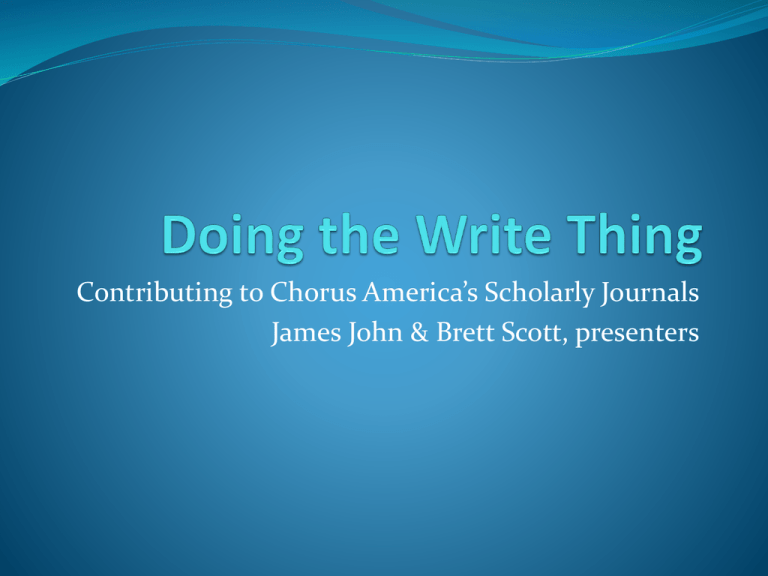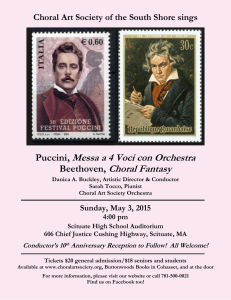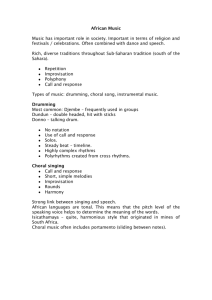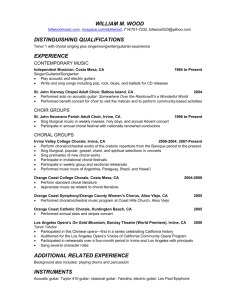Doing the Write Thing
advertisement

Contributing to Chorus America’s Scholarly Journals James John & Brett Scott, presenters A Brief History – ACR Founded in 1958 as The Bulletin of the American Choral Foundation Name changed to American Choral Review in October 1961 (the journal celebrated its 50th Anniversary under this title in 2011) Past Editors Alfred Mann (1958-1999) William Weinert (1999-2011) A Brief History – ACR Four issues per year until the 1990s, when two per year (with an eight page limit) became standard Online only as of Summer/Fall 2009, Volume 51, No. 2 Three indices exist • 1958-1972, 1967-1989 and 1997-2011 • all three indices need to be combined, and eight-year gap needs to be filled Issues from 2002-present are available online Issues prior to 2002 are available only through research libraries that carried a subscription A Brief History – ACR Early copies contain an incredible variety of topics • one or two main articles addressing musicological or performance practice issues • additional articles on: • conducting • vocal/choral pedagogy • concert reports from throughout U.S. & abroad • reviews of books, scores and recordings • etc. Occasional issues reach monograph length (Larsen, Handel Studies, 1972; Mann, Bach Studies, 1985) ACR – Survey of Early Articles The 1960s in particular reads like a compendium of articles by leaders in the field • Noah Greenberg on “The Choirmaster and the Renaissance • • • • • • • Choral Repertory” Thurston Dart on “Handel and the Continuo” Daniel Pinkham on “Intonation, Dissonance, Sonority” Jens Peter Larsen on “Esther and the Origin of the Handelian Oratorio Tradition” Wilhelm Ehmann on “Performance Practice in Bach’s Motets” Steven Walsh on “Stravinsky’s Choral Music” Walter Collins on “Choral Editing Standards” Robert Shaw on “Music and Worship in the Liberal Church” A Brief History – ACR Issues became shorter in the 1990s • two per year (rather than four) • eight-page limit (budget constraints?) • usually one main article plus reviews and concert reports, which is the current format With advent of online only format in 2009, the length of each issue is no longer restricted ACR – Survey of Recent Articles • “‘Et Incarnatus’ and ‘Crucifixus’: The Earliest and Latest Settings of Bach’s B-Minor Mass”, by Christoph Wolff (two-part article, Spring and Fall 1999) • “The Litany of Loreto: Sacred Music in 18th-century Austria”, by James I. Armstrong, Jr. (Summer/Fall 2000) • “A Contemporary Vision of the End: R. Murray Schafer’s Apocalypsis, “ by L. Brett Scott (Summer/Fall 2003) • “Franz Liszt’s Oratorio Christus: Following the Paper Trail”, by David Friddle (Winter/Spring 2005) • “Choral Music as Literary Criticism: A Study of the Textual Dimension of Music”, by Coreen Duffy (Summer/Fall 2007) • “Arthur Farwell’s New York City ‘Song and Light’ Festival”, by Alden Snell (Summer/Fall 2011) A Brief History – RMS Began in January 1959 as the Research Memorandum Series Published monthly by American Choral Foundation By 1996 Published 2x/year (Spring/Fall) Previous Editors Walter Collins David DeVenney A Brief History – RMS Issues from 2002-present are available online Issues prior to 2002 are available only through research libraries that carried a subscription Index 1959-1970 Common themes Repertoire lists, performance practice, composer bibliographies Articles by Alice Parker, Margaret Hillis, Samuel Adler Survey of Recent Articles Index 1996-2011 Still listed as a “Journal of the American Choral Foundation”, published by Chorus America Repertoire lists, performance practice, composer bibliographies Where We Are Now – ACR American Choral Review is an online journal exploring choral repertoire and issues of performance practice pertaining to music of all periods as well as commenting on recent scores, recordings, books, and performances. ACR strives to make recent research more widely known to conductors, and to bring great and perhaps lesser-known repertoire to the attention of the choral community at large. Where We Are Now – ACR Published semi-annually (Summer/Fall and Winter/Spring) Peer Reviewed • Three-person Editorial Board Michael Anderson (Eastman School of Music) David DeVenny (West Chester University) William Weinert (Eastman School of Music) • All submissions are blind reviewed by the Editorial Board Submissions are encouraged for articles in the range of 4,000 words, though articles of greater length are considered Submissions are accepted at any time, and should be directed to James John, Editor (jmsjhn@aol.com) Where We Are Now – RMS Research Memorandum Series is a journal of bibliographic tools suitable to the choral director and/or to those researching choral music literature and performance practice. Often focuses on the works of one composer (both mainstream and lesser-known), listing their works by genre, style period, voicing, or another category. Can also serve as a bibliography, listing recent scholarly writings on the music of a composer, a country, or a genre of choral works. Where We Are Now – RMS Online format has allowed for greater length of articles Submissions are welcome any time. Abstracts can be sent directly to Brett Scott, Editor (lincoln.cornishscott@uc.edu). Looking Forward CA Membership Survey Survey summary What we learned Looking Forward: Importance of the Journals Provide the opportunity to explore intriguing pieces, various repertories, particular composers, in-depth Spark repertoire ideas, provide interpretive insights Provide a source of well-researched historical background for program notes and pre-concert lectures, as well as for giving context to performers, board members, donors Provide a publishing venue for those in academia Encourage development of new scholars Create a living document for future generations about evolving perspectives on choral music in our time Future Projects Reconstruct the Index/History of the Journals Create Annoted Index Locate missing issues Make back issues available online Review Editorial/Submission Process for RMS Collaboration between the two journals Expand content within the online format Q & A: Getting to Know Our Readers Were you aware of the journals before this session? How have you found the journals useful in your professional life? Are there particular composers/pieces/repertoires that you would like to see articles on? How do you view the role of scholarly journals within Chorus America? What else would you like from your journals? Are you interested in writing for one of the journals? Your turn! Developing Ideas From Interests to Topics From Topics to Questions From Questions to Significant Answers Working groups Worksheet Wrap-up and Thanks


